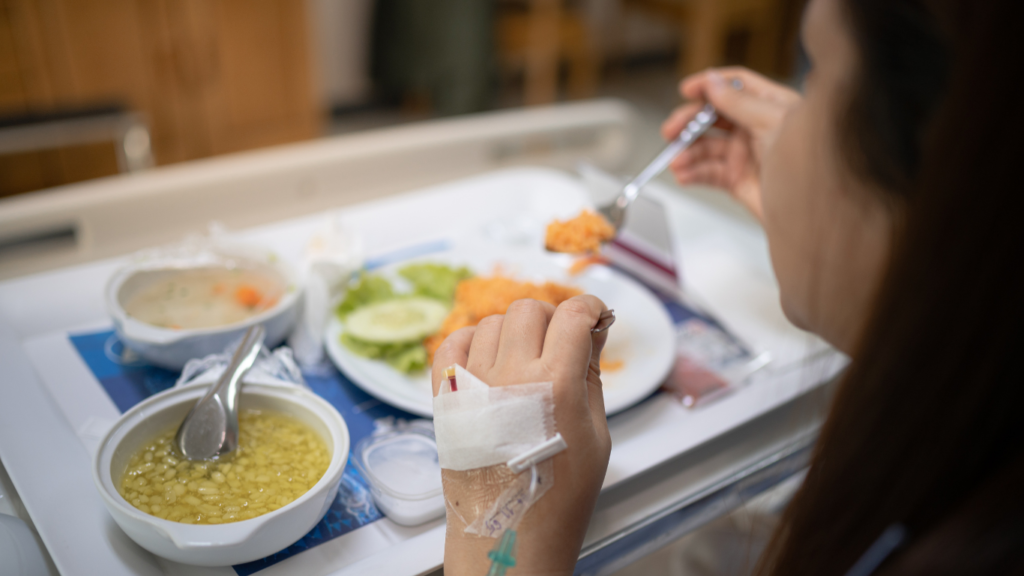
What you eat at night affects your sleep. Some foods promote relaxation and are easy on the digestive system, whereas some are heavy and sleep disruptive in nature. Eating the wrong foods before bedtime can be bad for both sleep and overall health.
Let us discuss some of the best and worst foods to eat before going to bed.
Foods to avoid at night:
- Caffeine: Caffeine, a natural stimulant found in coffee, tea, and various other beverages, can indeed disrupt sleep patterns if consumed in excessive amounts or too close to bedtime. Its stimulating effects on the central nervous system can make it difficult to fall asleep and stay asleep, leading to poor sleep quality. Caffeine works by blocking the action of adenosine, a neurotransmitter responsible for promoting sleep and relaxation. By interfering with adenosine, caffeine increases alertness and arousal, which is beneficial during waking hours but can be detrimental when trying to wind down for sleep. Avoid caffeine-containing beverages like coffee, tea, and cola at night and late in the evening.
- Alcohol: Avoiding alcohol at night is crucial for several reasons. Firstly, alcohol disrupts the quality of sleep. While it may initially make you feel drowsy and help you fall asleep faster, it ultimately interferes with your sleep cycle, leading to fragmented and shallow sleep. This can leave you feeling tired and groggy the next day, affecting your productivity and mood.
Additionally, alcohol is a diuretic, meaning it increases urine production and can disrupt your body’s natural hydration balance, potentially leading to dehydration during the night. Moreover, consuming alcohol before bedtime can exacerbate snoring and sleep apnea symptoms, further disrupting your sleep patterns and potentially leading to serious health issues over time. Alcohol consumption at night can also increase the risk of accidents and injuries, as it impairs cognitive function, coordination, and judgment.

- Heavy, Greasy and Spicy Meals: Large, heavy meals or spicy foods can lead to discomfort and indigestion, making it difficult to fall asleep or stay asleep throughout the night. Spicy foods, in particular, can cause heartburn and acid reflux, which may result in a burning sensation in the chest and throat, disrupting sleep and causing discomfort. Heavy meals, rich in fats, require more time and energy for digestion, potentially leading to bloating, gas, and discomfort, which can interfere with the body’s ability to relax and enter into a restful sleep state.
- Sugary Foods: Avoiding sugary foods at night is essential for maintaining a healthy lifestyle and promoting better sleep quality. Consuming sugary foods close to bedtime can lead to several negative effects on both physical health and sleep patterns. Firstly, foods high in sugar can cause a rapid spike in blood sugar levels, followed by a subsequent crash, which can disrupt sleep cycles and lead to restless nights. Additionally, sugary foods can stimulate brain activity and make it more difficult to fall asleep, as they can interfere with the production of hormones like melatonin, which regulate the sleep-wake cycle.
- Highly Processed or Junk Foods: foods are often high in unhealthy fats, sugars, and artificial additives, which can wreak havoc on your digestive system and lead to discomfort, bloating, and indigestion during the night. Consuming such foods before bed can also disrupt your body’s natural sleep-wake cycle, as they tend to be difficult to digest and can cause spikes and crashes in blood sugar levels, leading to disrupted sleep patterns and poor sleep quality. Furthermore, processed and junk foods are typically low in essential nutrients and high in calories, which can contribute to weight gain and increase the risk of obesity-related health problems over time.

Foods to eat at night:
- Complex Carbohydrates: Foods like whole grain bread, oatmeal, or sweet potatoes take longer to digest compared to simple carbohydrates, providing a steady release of energy throughout the night. This sustained energy can help stabilize blood sugar levels and prevent nighttime cravings or hunger pangs, promoting better sleep quality and reducing the likelihood of waking up in the middle of the night due to hunger. Consuming complex carbohydrates before bed can enhance the production of serotonin, a neurotransmitter that promotes relaxation and regulates mood, potentially aiding in falling asleep faster and achieving a deeper, more restorative sleep.
- Lean Protein and Dairy: Foods like turkey, chicken, or tofu contain tryptophan, an amino acid that can promote sleep when combined with carbohydrates. Dairy products like Milk and yogurt contain tryptophan as well as calcium, which can help your body produce melatonin, a hormone that regulates sleep. Protein rich foods can contribute to feelings of satiety and help stabilize blood sugar levels, potentially reducing late-night cravings and promoting better sleep quality.
- Bananas: Bananas are rich in potassium, magnesium, vitamin B6 and tryptophan amino acid which are essential nutrients that promote relaxation and help regulate sleep patterns. Potassium helps to relax muscles, including the ones responsible for falling asleep, while magnesium plays a crucial role in neurotransmitter function, aiding in the regulation of sleep. A banana before bedtime can therefore potentially improve sleep quality, making it easier to fall asleep and stay asleep throughout the night.
- Nuts: Nuts are rich in protein, healthy fats, fibre, vitamins, and minerals, making them a nutrient-dense snack choice. Protein-rich foods before bedtime can promote muscle repair and growth during sleep, aiding in overall recovery, especially after physical activity. Healthy fats found in nuts, such as omega-3 fatty acids, can help support heart health by lowering bad cholesterol levels and reducing inflammation. Certain nuts, like almonds and walnuts, contain melatonin, a hormone that potentially improves sleep quality when consumed before bedtime. Almonds, walnuts, and pistachios are good sources of magnesium and also contain tryptophan which promotes sleep. Thus, incorporating a handful of these nuts into your nighttime routine can be a delicious and nutritious way to support good sleep and overall health.
- Cherries: Cherries are not only delicious but also packed with nutrients that can promote better sleep. These ruby-red gems are a natural source of melatonin, the hormone that regulates sleep-wake cycles. Consuming cherries, whether fresh or dried, can help increase melatonin levels in the body, signalling to your brain that it’s time to wind down and prepare for sleep. Additionally, cherries contain antioxidants and anti-inflammatory compounds, which may further contribute to improved sleep quality by reducing inflammation and oxidative stress in the body.
Along with the right kind of food, portion control is also extremely important at night. Eating light at night helps you have a better sleep than eating a large meal.